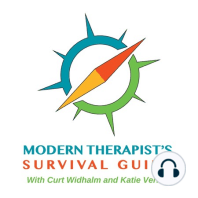33 min listen

How to Be Accessible Beyond the Sliding Scale
FromThe Modern Therapist's Survival Guide with Curt Widhalm and Katie Vernoy
How to Be Accessible Beyond the Sliding Scale
FromThe Modern Therapist's Survival Guide with Curt Widhalm and Katie Vernoy
ratings:
Length:
36 minutes
Released:
Nov 29, 2021
Format:
Podcast episode
Description
How to Be Accessible Beyond the Sliding Scale An interview with Lindsay Bryan-Podvin, LMSW, about how therapy can be accessible (and not just financially). Curt and Katie chat with Lindsay about capitalism versus money exchange, the social enterprise model, and how therapists can make a good living without feeling like greedy capitalists. We also explore the many different types of accessibility and the importance of setting your fees based on your needs and values rather than as a mechanism to single-handedly fix the broken system or to meet an artificial money goal. It’s time to reimagine therapy and what it means to be a therapist. To support you as a whole person and a therapist, your hosts, Curt Widhalm and Katie Vernoy talk about how to approach the role of therapist in the modern age. Interview with Lindsay Bryan-Podvin, LMSW, Mind Money Balance Lindsay Bryan-Podvin (she/her) is a biracial financial therapist, speaker, and author of the book "The Financial Anxiety Solution." In her therapy practice, Mind Money Balance, she uses shame-free financial therapy to help people get their minds and money in balance. She's expanded her services to help private practice therapists with their money mindset, sustainable pricing, and authentic marketing so they can include financial self-care in their work. She lives with her partner and their dog on the traditional land of the Fox, Peoria, Potawatomi, and Anishinabewaki peoples also known as Michigan. In this episode we talk about: How therapy can be more accessible (and not just monetarily) The money “shit” that gets in the way of us thinking about other options for accessibility Decreasing stigma and the notion that therapy is by and for white folks Are we making our practices accessible for all sorts of folks? ADA compliance, supporting neurodivergent and disabled folks Cultural competence, the ability to apply that in sessions with clients who are different than us Being embedded in our communities Taking therapy out of the shadows The challenges in getting out and having a larger voice How accessibility is intertwined with therapist visibility How to become part of your community in effective and impactful ways Financial ways to make your practice more accessible beyond sliding scale Social Enterprise Model: intersection of what you do well, what values you stand for, and what can you get paid well to do Feeling like a greedy capitalist What it means to be paid well How to think about setting your fees Fee-setting based on what you need to survive and thrive (not capitalist principles) The problem with “know your worth” The big cognitive shift required to move from community mental health pricing and work-life balance, fees Tying money to quality of life, not specific monetary goals Getting to “enough” not more and more Capitalism versus money exchange The wealth of knowledge we have as therapists (and how therapists take it for granted and/or devalue it) Sharing your knowledge as a mechanism of accessibility to your whole community To practice self-care, you have to be able to afford it Our Generous Sponsor: Trauma Therapist Network Trauma is highly prevalent in mental health client populations and people are looking for therapists with specialized training and experience in trauma, but they often don't know where to start. If you've ever looked for a trauma therapist, you know it can be hard to discern who knows what and whether or not they're the right fit for you. There are so many types of trauma and so many different ways to heal. That's why Laura Reagan, LCSW-C created Trauma Therapist Network. Trauma Therapist Network is a new resource for anyone who wants to learn about trauma and how it shows up in our lives. This new site has articles, resources and podcasts for learning about trauma and its effects, as well as a directory exclusively for trauma therapists to let people know how they work and what they specialize in, so potential clients can find them. Trauma
Released:
Nov 29, 2021
Format:
Podcast episode
Titles in the series (100)
Therapist Know Thyself: A discussion about Self-Awareness and Self-Assessment, to Improve your Clinical Skills and your Career by The Modern Therapist's Survival Guide with Curt Widhalm and Katie Vernoy